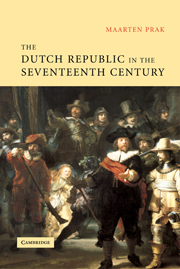Book contents
- Frontmatter
- Contents
- List of illustrations
- Acknowledgements
- Chronology
- Map
- Introduction: The enigma of the Republic
- 1 A turbulent beginning
- Part I War without end
- Part II Golden Age: economy and society
- Part III Unity and discord: politics and governance
- Part IV An urban society
- Conclusion: The end of the Golden Age
- Further reading
- Index
Introduction: The enigma of the Republic
Published online by Cambridge University Press: 05 February 2015
- Frontmatter
- Contents
- List of illustrations
- Acknowledgements
- Chronology
- Map
- Introduction: The enigma of the Republic
- 1 A turbulent beginning
- Part I War without end
- Part II Golden Age: economy and society
- Part III Unity and discord: politics and governance
- Part IV An urban society
- Conclusion: The end of the Golden Age
- Further reading
- Index
Summary
In 1908, Dr Johan Prak, a general practitioner in the provincial town of Ter Apel, acquired P. L. Muller's recently reissued book Onze Gouden Eeuw (Our Golden Age). The copy bears his name and the date, written in his unmistakably nineteenth-century hand. The book, the first edition of which had appeared in 1897, bore the subtitle De Republiek der Vereenigde Nederlanden in haar bloeitijd (The Republic of the United Netherlands in its heyday). Muller's book was not intended for scholars, and perhaps this contributed in some measure to its success. The ‘inexpensive reprint’ of 1908 – comprising two sizeable volumes, bound and gilt-edged – was still a superb piece of work, containing 967 pages chock-full of information and hundreds of illustrations in colour and black-and-white. My great-grandfather, the doctor from Ter Apel, might even have read it. His son – my great-uncle Wim Prak, who took a keen interest in history, especially naval history – certainly studied the book, as evidenced by the occasional note in his handwriting, marking passages which particularly attracted his attention or with which he disagreed, in which case he wrote ‘incorrect’ in the margin.
In his history of the Golden Age, Muller, archivist of Rotterdam and professor extraordinarius at Leiden University, repeatedly voiced his surprise: first at the fact that a country ‘small in size and limited in population was capable of acquiring a measure of power equal to that of the large, traditionally established monarchies’, then at the ‘unparalleled prosperity’ achieved by that ‘uncommonly talented generation’, and finally at the ‘defectiveness of its national institutions’, which was made up for only by the quality of its governors.
- Type
- Chapter
- Information
- The Dutch Republic in the Seventeenth CenturyThe Golden Age, pp. 1 - 6Publisher: Cambridge University PressPrint publication year: 2005



